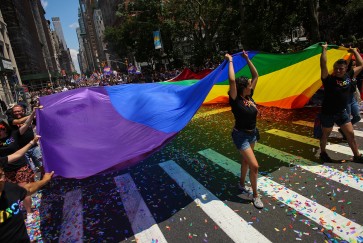On the eve of National Coming Out Day, LGBTQ+ communities, allies and the lawmakers working for equality face a host of challenges to progress made in the last decade.
Northwestern Now talked with faculty experts across the University about an array of efforts to protect marriage equality in the wake of the Roe v. Wade Supreme Court decision, “don’t say gay” in school bills, monkeypox, trans health care and more.
With the recent Dobbs decision, how should we be feeling about marriage equality?
“The recent decision in the Dobbs v. Jackson Women's Health Organization case suggests the Supreme Court’s conservative justices have the power to take away recognized rights that we all assume are here to stay,” said Héctor Carillo, professor of sociology and gender and sexuality studies. “It has made it clear that progressive sexuality-related social movements can never lower their guard despite their achievements.”
“There’s enough room in this society for everyone to pursue their own understanding of what makes a good life,” said Andrew Koppelman, professor of law. “The Respect for Marriage Act and the Fairness for All Act would both be steps in the right direction.”
What is the benefit of education that celebrates queer people?
“Books telling the stories of LGBTQ people or that offer advice on coming out can be a lifeline for LGBTQ young people seeking to understand their sexuality, gender or place in the world. Depriving young people of these stories will only make them feel isolated and invisible,” said clinical psychologist Brian Mustanski.
“For kids and teens who are not LGBTQ, exposure to LGBTQ-inclusive education is also important, as it can be a powerful way to combat stigma and promote a broader worldview,” said Kathryn Macapagal, also a clinical psychologist.
How have standards of trans health care changed in 2022?
“The World Professional Association for Transgender Health still has work to do to ensure its standards of care are representative of the needs and experiences of all non-cisgender people,” said alithia zamantakis, a postdoctoral scholar and community activist for intersectional queer/trans justice. “Future iterations of the standards of care must include more stakeholders per committee, greater representation of transgender experts and stakeholders of color.”
> Related: Prioritizing your safety and well-being while coming out
How can identities intersect as a person is coming out?
“Many people go through a phase — I would include myself — where it is difficult to reconcile spirituality with sexuality,” said E. Patrick Johnson, dean of the School of Communication. “That’s a long process for many people. And for some, it’s an ongoing process. The Black church, in particular, established one of the original ‘don’t ask, don’t tell’ scenarios for queer people in congregations. It’s not unusual to have people in the church who are still struggling even though they are leading the choir or in the pulpit.”
How has the public health response played into the challenges monkeypox has caused?
“The monkeypox outbreak is particularly disturbing in that this was not a new infection. Being endemic in Africa for many decades, there is a vaccine and a treatment,” Dr. Rob Murphy said. “It’s obvious that there is something terribly wrong with our public health approach to emerging and re-emerging infectious diseases. In this environment, it is imperative that all stakeholders push as hard as possible for access to diagnostics, care and treatment.”
What are some factors that have led to reduced HIV transmission and improved outcomes for Black sexual minority men?
“The strengths and resiliencies of Black sexual minority men who are able to stay HIV-negative are derived from how they learned, as Black boys and young men, to survive in a world that is anti-Black and are predicated on ‘The Talk,’ a cultural transmission of methods for ‘not getting killed’ while ‘being Black’ and lay at the intersection of their racial and sexual identities as Black sexual minority men,” said Jagadīśa-devasrī Dacus, a research assistant professor and social worker.
The experts participating in this Q&A represent a wide range of perspectives and fields of study from around Northwestern.
Héctor Carrillo is a professor of sociology and gender and sexuality studies at the Weinberg College of Arts and Sciences, and has affiliations with Latino/a Studies, Latin American and Caribbean Studies, Science and Human Culture, the Institute for Policy Research (IPR) and the Institute for Gender and Sexual Minority Health and Wellbeing (ISGMH).
Andrew Koppelman is the John Paul Stevens Professor of Law at the Northwestern Pritzker School of Law and a professor of political science.
Brian Mustanski is a clinical psychologist, director of ISGMH, and a professor of medical social sciences, infectious diseases and psychiatry and behavioral sciences, and co-director of the NIH-funded Third Coast Center for AIDS Research.
Kathryn Macapagal is a clinical psychologist, associate professor in medical social sciences at the Northwestern University Feinberg School of Medicine, and associate director of The Center for Translational Health Research and Interventions Advancing Equity for Sexual and Gender Minorities at ISGMH.
alithia zamantakis is a postdoctoral scholar at ISGMH who conducts qualitative research and is a community activist for intersectional queer/trans justice.
E. Patrick Johnson is dean of the School of Communication and Annenberg University Professor at Northwestern.
Robert Murphy is executive director of the Havey Institute for Global Health, professor of medicine and biomedical engineering and the John Phair Professor of Infectious Diseases at the Feinberg School of Medicine.
Jagadīśa-devasrī Dacus is associate director of ISGMH, a research assistant professor and social worker.


